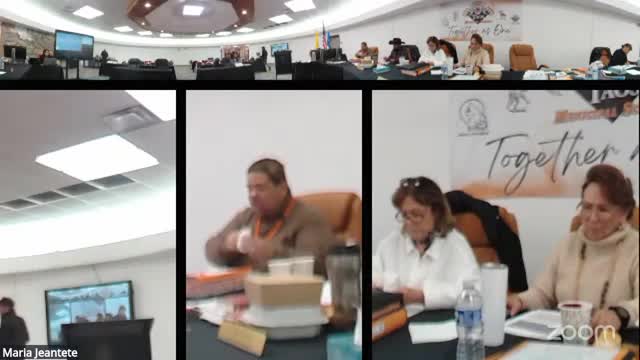Taos Municipal Schools board holds training on meeting norms, agenda setting and complaint processes
Get AI-powered insights, summaries, and transcripts
Subscribe
Summary
At a March 8 special work session the Taos Municipal Schools board received training on board roles, Open Meetings Act compliance, consent-agenda practice, handling public complaints and employee concerns; the presenter urged use of clear agenda processes and paperwork to protect staff and the district.
The Taos Municipal Schools Board of Education met in a special work session on March 8, 2025, to receive training on board norms, roles and responsibilities, with a focus on agenda setting, Open Meetings Act compliance, and procedures for handling public complaints and personnel matters.
Trainer Skye Jones urged board members to use established procedures to keep meetings orderly and protect confidential information. "If we don't do that consistently ... we end up with a breakdown of those norms," Jones said, arguing that disciplined agenda practice, clear consent-agenda rules and the chain-of-command for complaints help boards run shorter, more effective meetings.
Jones told the board that members should ask the superintendent to place items on future agendas as the primary tool for pursuing district priorities, and she described specific timelines the board follows: notify the superintendent at least five business days before an agenda is finalized (and at least eight days before a meeting), and distribute supporting materials to board members at least 72 hours before a meeting. She also recommended that items already vetted in committees are appropriate for the consent agenda and warned that consent agenda items cannot be pulled for discussion after the agenda has been approved.
The presenter reviewed confidentiality limits and records law, telling members to avoid discussing personnel matters, student-identifying information or tactical safety and technology vulnerabilities in public sessions. She said members sometimes inadvertently create public-record obligations when they converse about agenda items from personal devices and reminded members that such communications can be subject to public-record requests.
Jones walked through the district's complaint pathways for different categories — general concerns, instructional resources, facilities and personnel — and urged board members to give concerned community members the relevant policy, regulation and form so the superintendent can review and issue a written decision where required. She also reviewed whistleblower protections, cautioning that employees who circumvent the chain of command could face insubordination claims even when they seek to avoid retaliation.
Board members raised meeting-management concerns that they said lengthen sessions. President Flores argued for starting public meetings promptly to respect staff and the public: "I try to be here at least 50 minutes prior to and be set up and ready to start," he said. Board members and the trainer discussed using consent agenda, consolidating routine reports (for example moving some items to quarterly reports) and reserving full discussion for high-priority topics such as updating the facilities master plan.
The training included practical guidance on avoiding Open Meetings Act violations, following grievance timelines in collective bargaining agreements, and the value of documenting referrals so members do not inadvertently hinder administrative processes. Jones directed board members to the district's policy portal for the specific policy language and forms.
Board members did not take formal action during the session; they noted upcoming meetings including a dispute-resolution teleconference and a regional meeting in Mesa Vista.
The training materials referenced policies and routine practices the presenter said are available through the district's policy portal and recommended that members use the agenda-setting process and written forms to channel constituent concerns into the administrative review process.
